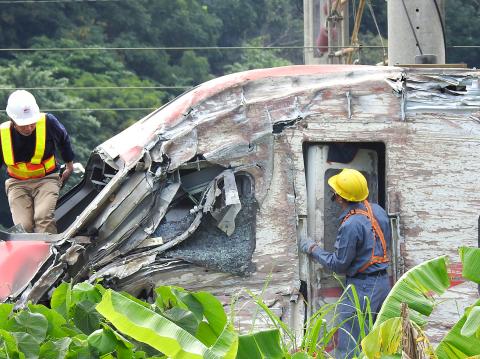The Executive Yuan yesterday unveiled draft legislation for the planned national transportation safety council, which is expected to be formed next year at the earliest.
Premier William Lai (賴清德) approved the bills at a meeting, Executive Yuan spokeswoman Kolas Yotaka told a news conference in Taipei.
One bill seeks to change the name of the Organizational Act of the Aviation Safety Council (飛航安全調查委員會組織法) to the organizational act of the national transportation safety council and outlines what the proposed council’s purview would be and how it would be staffed.

Photo: CNA
To complement the bill, a draft amendment to the Aviation Occurrence Investigation Act (飛航事故調查法) was also introduced, which seeks to rename the act to transportation occurrence investigation act and recommends an investigation procedure for major rail, air or marine accidents.
The bills were drafted in the wake of the derailment of Puyuma Express No. 6432 in Yilan County on Oct. 21, in which 18 people were killed and more than 200 were injured, Kolas said, adding that they are part of the premier’s promise to the public to create an impartial and professional body capable of independently probing major transportation accidents.
The council would be modeled after the Japan Transport Safety Board and the US National Transportation Safety Board by expanding the Aviation Safety Council (ASC) to include experts on rail, marine and air transportation safety, she said.
Lai said the bills would be delivered to the Legislative Yuan for review and instructed the Aviation Safety Council and the Directorate-General of Budget, Accounting and Statistics to communicate extensively with the four legislative caucuses in the hope that they would soon be passed, Kolas said.
The proposed council would require about 100 staff members, including the 23 full-time ASC personnel, who are expected to be incorporated into it, ASC Chairman Young Hong-tsu (楊宏智) said.
The proposed council would employ experts specializing in all types of rail transportation systems, as well as experts in highway, sea and river transportation, Young said.
Asked what the bills’ definition of “major” transportation incidents would be, he said the question would have to be answered after the ASC and the Ministry of Transportation and Communications iron out the details.
The council could be created next year at the earliest, while it would take another two years for it to recruit specialists in all of the transportation fields, Young said.

An essay competition jointly organized by a local writing society and a publisher affiliated with the Chinese Communist Party (CCP) might have contravened the Act Governing Relations Between the People of the Taiwan Area and the Mainland Area (臺灣地區與大陸地區人民關係條例), the Mainland Affairs Council (MAC) said on Thursday. “In this case, the partner organization is clearly an agency under the CCP’s Fujian Provincial Committee,” MAC Deputy Minister and spokesperson Liang Wen-chieh (梁文傑) said at a news briefing in Taipei. “It also involves bringing Taiwanese students to China with all-expenses-paid arrangements to attend award ceremonies and camps,” Liang said. Those two “characteristics” are typically sufficient

A magnitude 5.9 earthquake that struck about 33km off the coast of Hualien City was the "main shock" in a series of quakes in the area, with aftershocks expected over the next three days, the Central Weather Administration (CWA) said yesterday. Prior to the magnitude 5.9 quake shaking most of Taiwan at 6:53pm yesterday, six other earthquakes stronger than a magnitude of 4, starting with a magnitude 5.5 quake at 6:09pm, occurred in the area. CWA Seismological Center Director Wu Chien-fu (吳健富) confirmed that the quakes were all part of the same series and that the magnitude 5.5 temblor was

The brilliant blue waters, thick foliage and bucolic atmosphere on this seemingly idyllic archipelago deep in the Pacific Ocean belie the key role it now plays in a titanic geopolitical struggle. Palau is again on the front line as China, and the US and its allies prepare their forces in an intensifying contest for control over the Asia-Pacific region. The democratic nation of just 17,000 people hosts US-controlled airstrips and soon-to-be-completed radar installations that the US military describes as “critical” to monitoring vast swathes of water and airspace. It is also a key piece of the second island chain, a string of

The Central Weather Administration has issued a heat alert for southeastern Taiwan, warning of temperatures as high as 36°C today, while alerting some coastal areas of strong winds later in the day. Kaohsiung’s Neimen District (內門) and Pingtung County’s Neipu Township (內埔) are under an orange heat alert, which warns of temperatures as high as 36°C for three consecutive days, the CWA said, citing southwest winds. The heat would also extend to Tainan’s Nansi (楠西) and Yujing (玉井) districts, as well as Pingtung’s Gaoshu (高樹), Yanpu (鹽埔) and Majia (瑪家) townships, it said, forecasting highs of up to 36°C in those areas